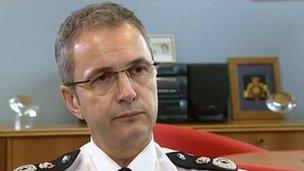Police and crime commissioner elections: South Wales
- Published

South Wales Police's chief constable is Peter Vaughan
On 15 November 37 police and crime commissioners will be elected in England along with four in Wales.
The PCCs, as they will be known, will be tasked with scrutinising their force and holding it to account. They will also be able to hire and dismiss the chief constable and set the force's budget.
The commissioners will be paid and are supposed to empower local people into having a say on how crime is tackled in their area.
Nominations for candidates in South Wales have now officially closed.
BBC News has taken a look at each of the police forces ahead of the elections.
South Wales Police
South Wales Police is a large force and covers the densely populated counties of Cardiff, Bridgend, Rhondda Cynon Taf, Merthyr Tydfil, Vale of Glamorgan, Neath Port Talbot and Swansea.
The two busy cities of Cardiff and Swansea are both situated in the force area, as well as the south Wales valleys, large coastal regions and prime tourist attractions such as Gower, Porthcawl, and Barry.
Busy travel links in the area include the M4 motorway, intercity rail lines, and Cardiff International Airport, and there are also many sporting venues such as the Millennium Stadium in Cardiff and the Liberty Stadium in Swansea.
Although only covering around 10% of the geographical area of Wales, the South Wales Police force area is home to 1,225,900 people - around 42% of the country's entire population.
The force's chief constable is Peter Vaughan and he is supported by Deputy Chief Constable Colette Paul, three assistant chief constables, a director of finance, a director of legal services and a director of human resources. Its headquarters is in Bridgend and the force is split into four divisional policing areas - northern, eastern, western and central.
The force is overseen by South Wales Police Authority and works in partnership with the three other Welsh forces, Gwent Police (with whom it shares legal services), Dyfed-Powys Police and North Wales Police through the Police Authority of Wales (PAW) and bodies such as the Welsh Extremism and Counter Terrorism Unit (WECTU).
Its local policing priorities are:
Make every contact count with members of the public.
Treat everyone with dignity and equality, respecting diversity and human rights.
Deliver a quality service.
Empower and develop strong and capable leaders to support effective policing in communities.
Work to provide value for money.
Funding
The South Wales Police budget for 2012-13 is £249m, which is a reduction of £8m on the previous year resulting from cuts in central government funding to South Wales Police.
The annual police precept for 2012-13, which is paid by local taxpayers through their council tax bills, is £169.42 for a band D property - a rise of 5%.
That compares to North Wales Police at £214.56 (2.5% increase), Dyfed-Powys Police at £198.54 (5% rise) and Gwent Police at £193.09 (2.66% rise).
As part of government spending cuts, South Wales Police has a target to save £43m by 2015.
It says it plans to exceed the target.
That means 292 police officer posts (9% fewer) will go by March 2015, leaving 74% of workforce in front line policing.
Crime and performance
Crime is decreasing in south Wales at a higher rate than in England and Wales as a whole, according to Her Majesty's Inspector of Constabulary (HMIC).
Recorded crime fell by 7% from December 2010 to December 2011, compared with a 3% fall across England and Wales.
Based on the number of crimes per 1,000 people recorded in the 12 months to December 2011, the force came 30th out of 422 forces (where first equals lowest crime rate).
Between December 2010 and December 2011, victim-based crime fell by 7%, robbery was down by 12%, burglary decreased by 2% and criminal damage and arson fell by 16%
HMIC 87% of victims in south Wales were satisfied with the service from South Wales Police, which is higher than the national figure.